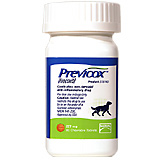Previcox Pet Medication

- Dog
- Availability: Prescription
- Active Ingredient(s):
- What is Previcox used for?
Previcox is a non-steroidal anti-inflammatory (NSAID) belonging to the coxib class and is used to control pain and inflammation due to osteoarthritis in dogs.
- How Previcox should be used?
The usual dose of Previcox in dogs is 2.27mg/lb given by mouth once a day. Previcox may be given with or without food.
- What are the side effects?
Side effects of Previcox may include decrease or increase of appetite, vomiting, change in bowel movements (such as diarrhea or black, tarry or bloody stools). Change in behavior such as decreased or increased activity level, incoordination, seizure or aggression. Yellowing of gums, skin or whites of eyes (jaundice). Change in drinking habits (frequency or amount consumed). Change in urination habits (frequency, color or smell). Change in skin (redness, scabs or scratching). Unexpected weight loss.
- What special precautions are there?
This medication should not be used in animals allergic to it or other NSAIDs. Previcox is for use only in dogs at least 7 weeks of age or older. The safe use of Previcox in pregnant, lactating or breeding dogs has not been evaluated. Previcox should not be given with other NSAIDs such as aspirin, carprofen, etodolac, deracoxib, meloxicam or tepoxalin. Previcox should not be given with corticosteroids such as prednisone, cortisone, dexamethasone or triamcinolone. Always tell your veterinarian and pharmacist what other medications your pet is taking.
- In the event of overdose?
Contact your veterinarian or veterinary emergency room immediately.
- How should I store Previcox?
Keep this medication in the container it came in, tightly closed. Store tablets at room temperature, between 59º-86º F. Brief periods up to 104º F are permitted. Throw away any medication that is outdated or no longer needed. Keep this medication out of the reach of children and pets.
Disclaimer: The information on this site is for educational purposes only and should NOT be considered veterinary advice. Any veterinary questions should be referred to your veterinarian. This information is NOT to be used for diagnosis or treatment of your pet. Please make your own inquiries with your veterinarian for the suitability of a product for your pet.




